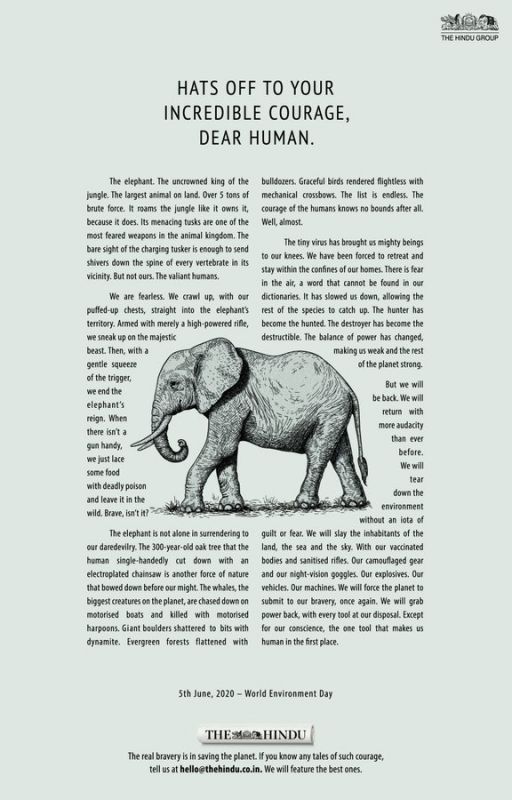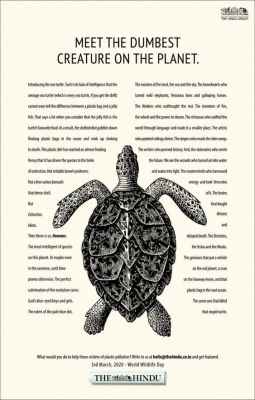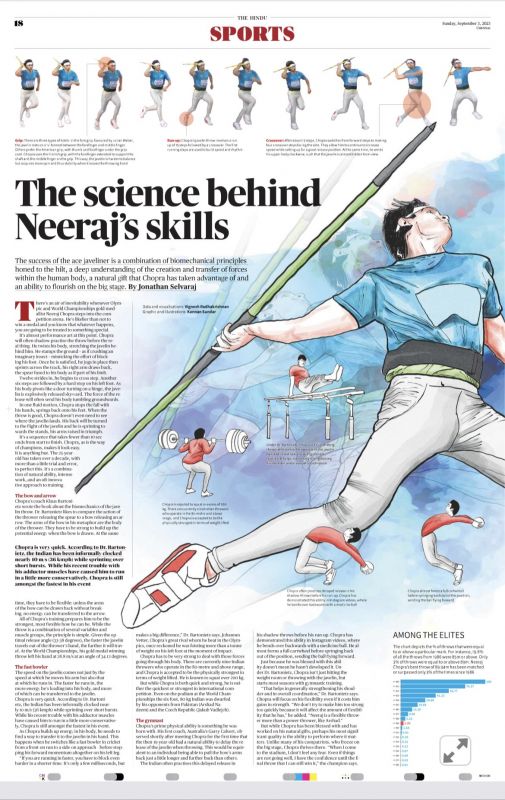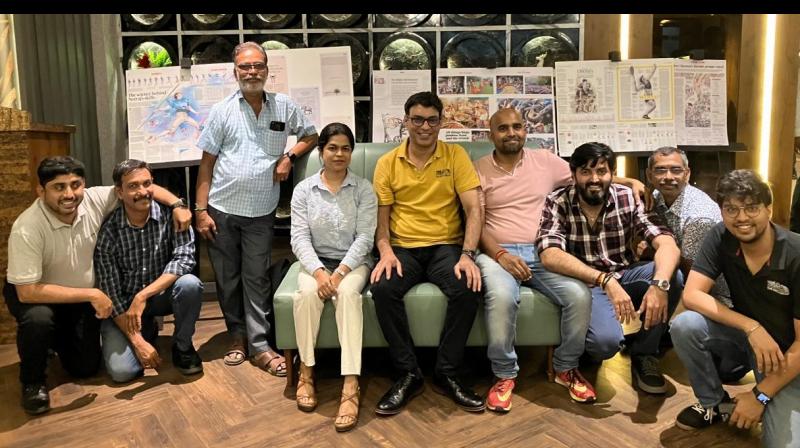The coffee machines at the head office of 146-year-old The Hindu Group Publishing in Chennai were moved to the corridors. Serving coffee in cabins was done away with for a reason. The intent was to get the 900-odd people to get to know each other. But this did not serve the purpose, as people held their coffee in one hand and were busy on their mobiles with the other. To solve for this, the coffee was served in the classic ‘dabara ’tumbler’ that required one to use both hands. To be sure, the temperature of the coffee was also raised by a few degrees and the ‘no sugar’ option was set as the default. Conversations started flowing as some stirred the sugar in their steaming coffees.
Getting people to know each other was part of a ‘More and Better’ framework, explained CEO LV Navaneeth, delivering the first ‘Ad Talks’ address organised by the Advertising Club Madras in Chennai on September 27, 2024. He spoke on the theme: ‘How to run a business creatively’.
“It’s at the intersection of products, processes and people that magic happens. The most important aspect is people. Whether you are an agency, into marketing, production or technology, we are in the business of ideas and ideas come from people. So how do we do more and better with people?” he posed.
He proposed that to improve effectiveness, one needs to know oneself. To build an efficient organisation, one needs to know one’s team and people. To harness synergies, one needs to get those people to know each other. And to attract talent, one needs to get others to know one’s brand. Navaneeth explained each of these submissions with examples from the company.
The brief to Ogilvy
“If my job is to attract talent, I need to showcase good work,” noted the CEO. He cited the case of an advertising campaign created by Ogilvy for The Hindu. Ahead of World Environment Day in May 2020, a creative was born as a response to a pregnant wild elephant being killed with a fruit laced with explosives in Kerala.

A couple of months prior, for World Wildlife Day, another creative had focused on sea turtles and the threat to the species from plastic waste in water. The speaker emphasised the need to trust the agency.
“Our brief to Ogilvy was to do advertising that reflects our brand, and shine the light on copy. Magic happens when you trust your agency,” he added.

The Hindu has also been working on the newspaper’s presentation of statistics. A framed picture of a two-pager on the science of his javelin skills following Neeraj Chopra’s heroics hangs in the Olympian’s living room today, noted the CEO. He underlined that the newsroom and publishing is a very different entity today and involves developers, visualisers, multimedia content creators, editors and more. There is a need for diverse talent, and there is a need to create cohesiveness within that motley bunch, he explained.

Navaneeth pointed to a mobile-first series of stories on the human-animal conflict from across India, and also to an illustration ahead of Paris 2024, urging the Olympics to boycott Israel.
“We are exploring engaging storytelling formats. It takes a lot of people to come together to do these stories. What worked in terms of workflow for over 145 years won’t work now,” he said.
‘Made of Chennai’
‘Made of Chennai’ is the group’s flagship annual IP and it brings together events spanning art, food, music, heritage and more to celebrate the city. The annual property was born in 2023 and has grown in stature now, revealed the CEO.
When ‘Made of Chennai’ was coined, the team was not sure that it sounded right. They drew inspiration from Chennai Super Kings’ ‘Whistle Podu’ which should technically have been ‘Whistle Adi’, but worked nevertheless – and how.
“We established a property in 2023 that had, by design, not too many sponsors,” noted Navaneeth, reasoning that it was important to focus on shaping and anchoring the property initially rather than trying to accommodate multiple sponsors’ interests. While it did not try to woo sponsors by the dozen, there was no dearth of partners who made the event a huge success, he added.
“Now we want to make it bigger and that would require the support of sponsors. We were very clear from the beginning that we want to create a 45-day calendar event that people look forward to,” noted Navaneeth.
A South-focused state-wise cooking contest not just celebrates home chefs, but also caters to sponsor interests. ‘Our State, Our Taste’ is the name of that IP.
Elsewhere, a BL ChangeMakers award property by the business daily from the group The Hindu BusinessLine celebrates those ushering in real change and making an impact in the world of business. A winner from the 2017 edition, visually impaired Srikanth Bolla, is the Founder and CEO of Hyderabad-headquartered Bollant Industries. The company produces eco-friendly, disposable and compostable products and packaging solutions, while creating employment opportunities for millions of differently-abled people.
Navaneeth noted that the Hindi-language biographical on the life of Bolla, titled ‘Srikanth’ starring Rajkummar Rao, hit screens in 2024.
Establishing thought leadership
Doing great work can build brands, but that alone can’t attract talent, reasoned the speaker, underlining the need to establish people as thought leaders.
A few years ago, when the group wanted to hire developers, tech people and visualisers, they simply weren’t getting CVs from the HR team.
“You join a boss as much as you join a company. Attracting talent is not a HR role. It is a leadership role,” he observed.
A mandate was established that all the thought leaders at the group would do out and speak, showcasing themselves before future talent. It was part of their KPIs. Today, the group does not face a challenge in attracting developers of tech folks, revealed the CEO.
“We made people famous. Some people say if you make them famous they will leave. I am happier having famous people leave us rather than not-so-famous people work for us,” he quipped.
Lessons from birthday cards and bars
How does a CEO running a company of 2,500 people get to know each of them. One way is to write them personalised birthday cards and signing them yourself. Navaneeth does that and claims that it gives him a fair insight on how well he knows his people, and also how well the company is doing on aspects like DEI.
“I try and personalise each card and if I cannot, that tells me I don’t know the person well enough. I write 200 to 250 cards a month and it tells me the age, profile, gender, it tells me who our future stars are likely to be, gaps in skill, and so on. I spend about 70 hours a year on that and it’s absolutely worth every minute,” he explained.
The speaker perhaps saved the best for last. Moving to the ‘Know yourself’ part of his presentation, he reflected on a phase of his professional life when things didn’t go as planned.
Navaneeth, who is in his second stint with The Hindu Group, quit his job in the broadcast space circa 2014-’15. After a bit of travel and learning digital marketing, he was back in the job market in four to five months. He was confident that he would get a job but the only offers were from people he had worked with, and sectors he had worked in – broadcast, print media and radio. He did not want to go back to doing something he had done already. There were several interviews – he failed in about 10 of them over a period of 20 to 25 days, he recalled. He finally moved to Indonesia, to a media agency.
“People who had worked with me were willing to give me a job. People who had not were not giving me a job. This rattled me. My hypothesis was that I need to improve myself at talking to strangers. So I started going to bars, alone,” revealed the CEO.
It was admittedly difficult and awkward at first – especially with women– but he was persistent.
“I got to a point where I could speak to anyone in a bar. You need to be a good listener. But I realised that to talk to a stranger you also need to be interesting as a person. So I started collecting stories that one could share, on about 300 different topics. I still talk to strangers. I find it useful,” he added.
“Today some of my best friends, advisors and mentors are strangers I met in a bar,” surmised Navaneeth.
For those who had not met him before the Ad Talks event, he was no stranger anymore. For he had become an endearing storyteller who regaled them with lived experiences on leading creatively.
(The author is an independent journalist, marketing and content consultant. He can be reached at gokul.campaign@gmail.com.)

.gif)










